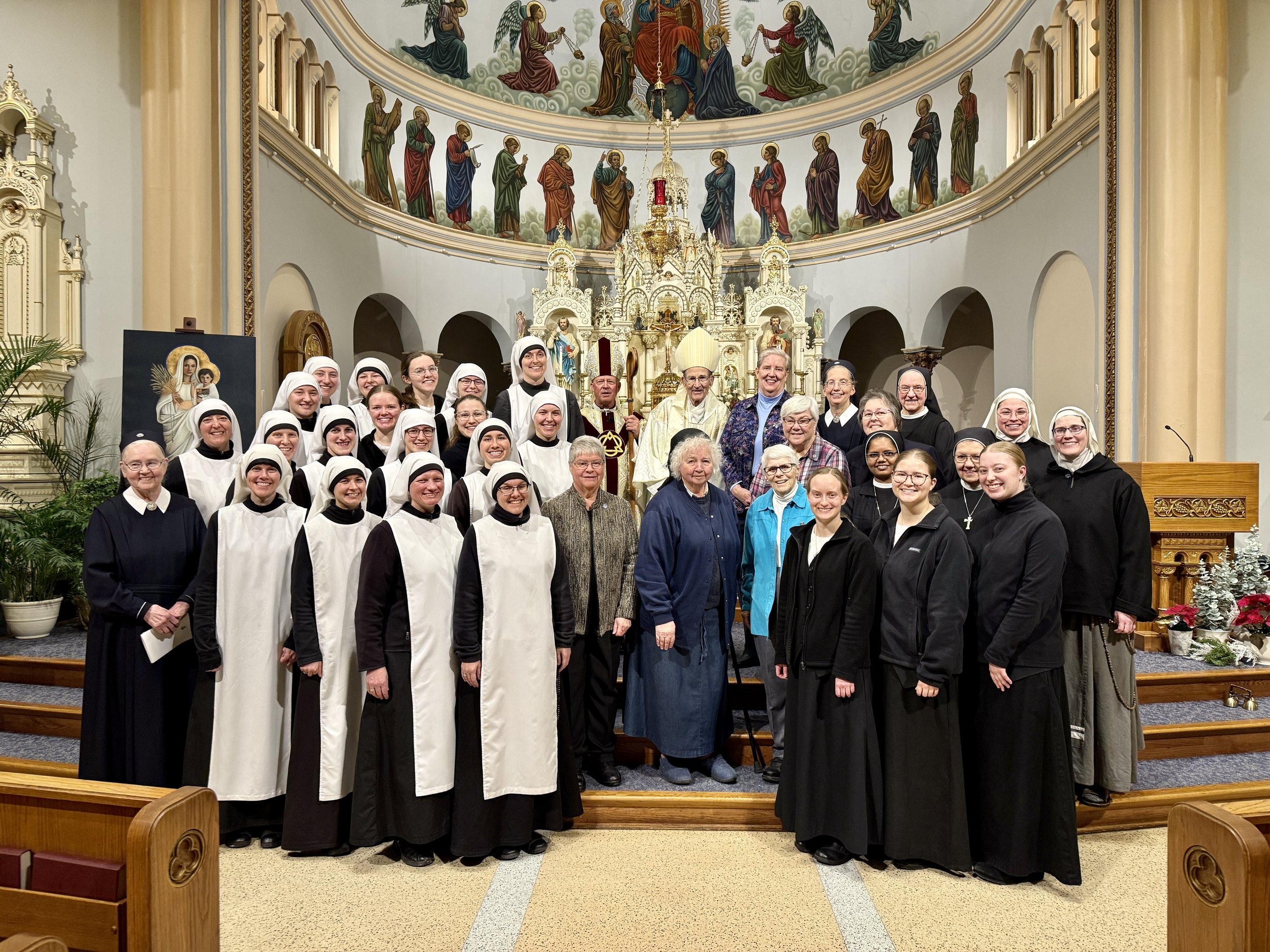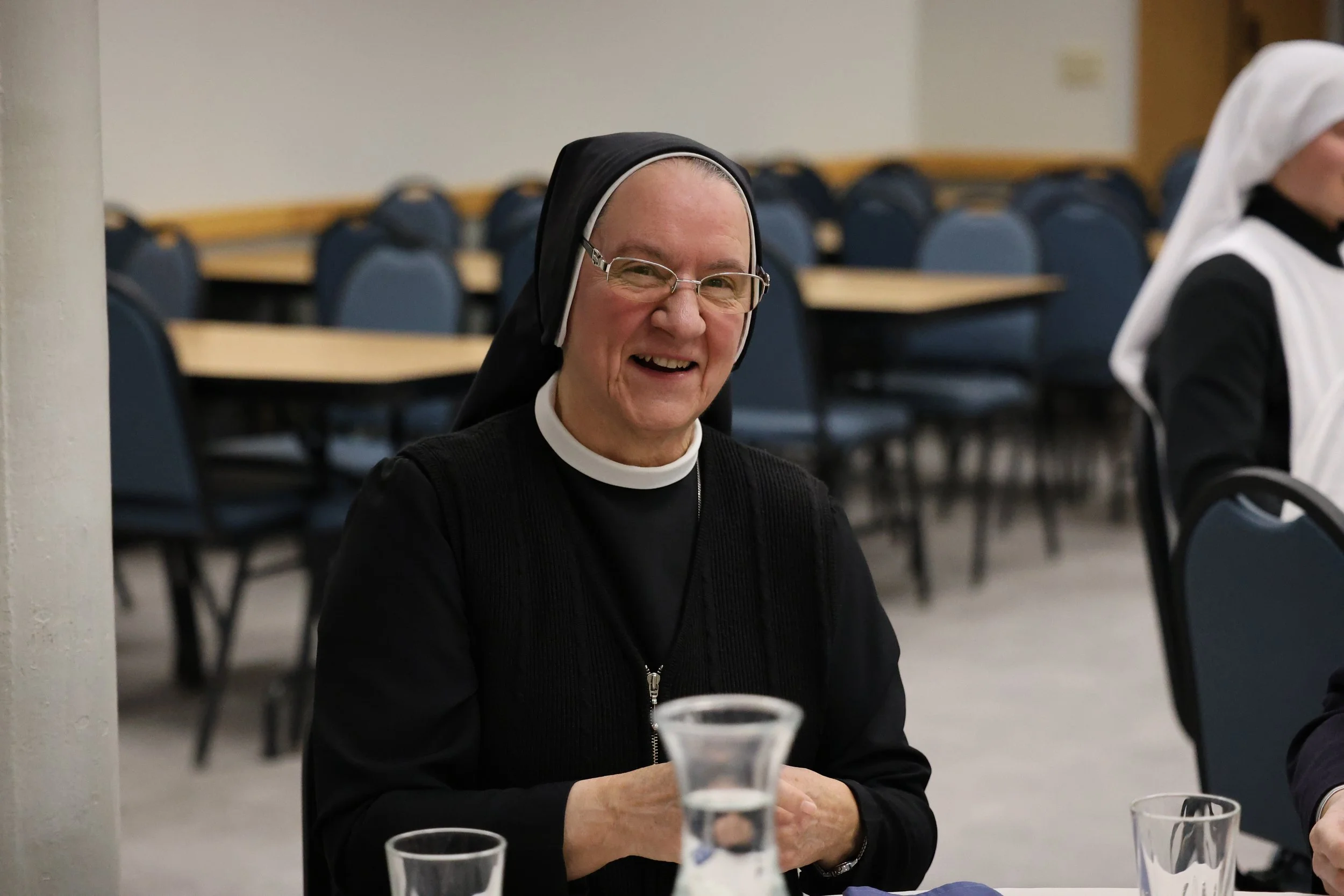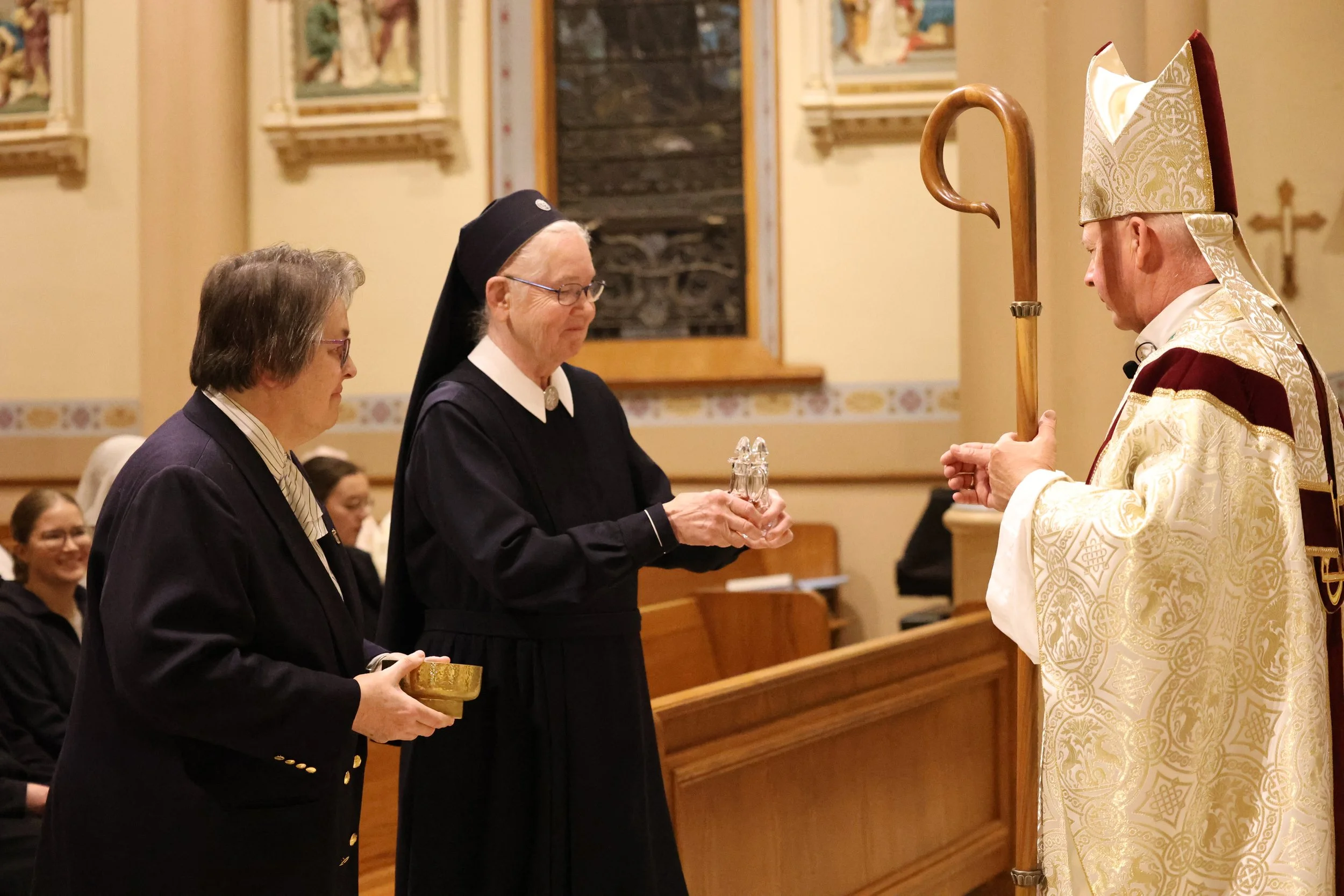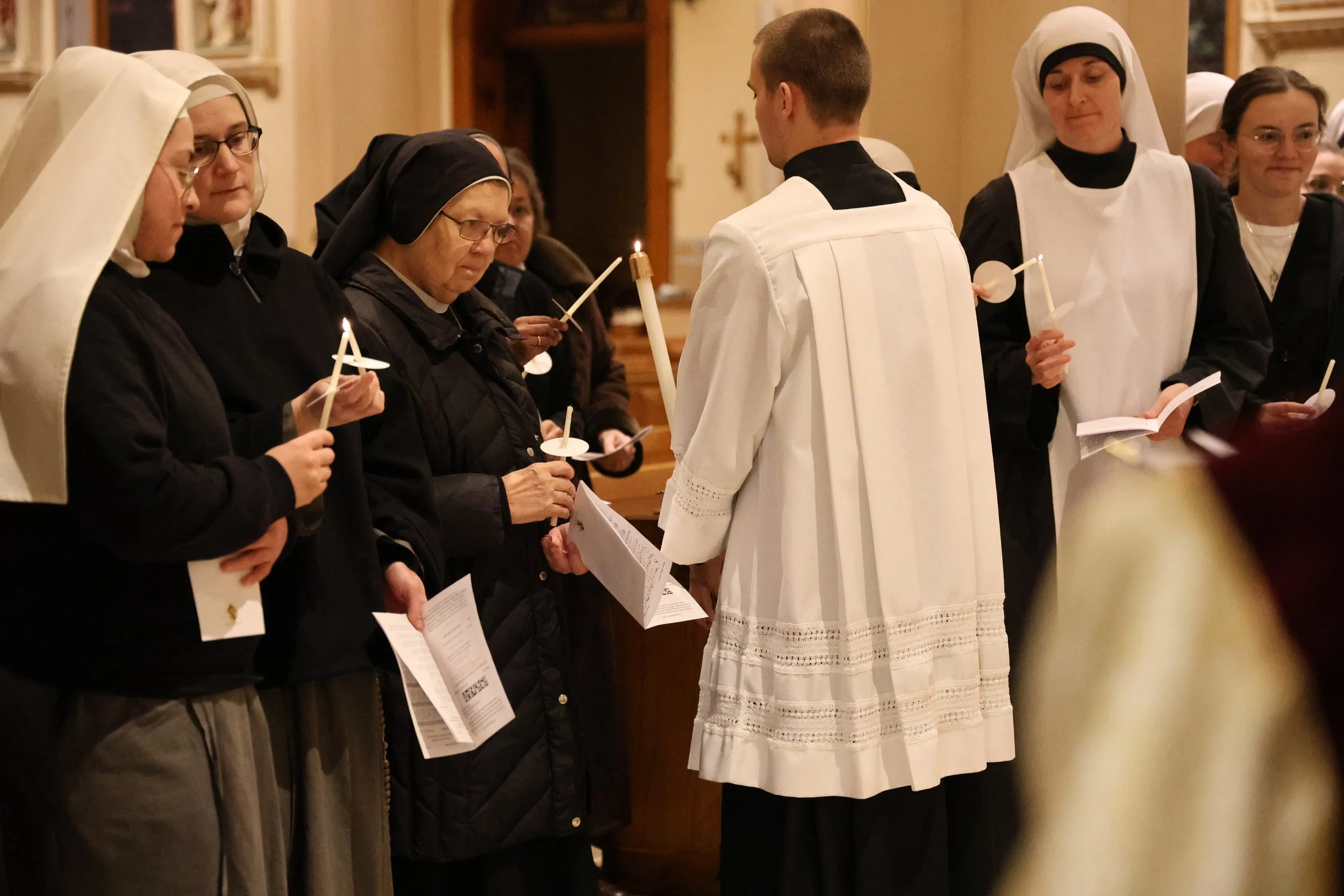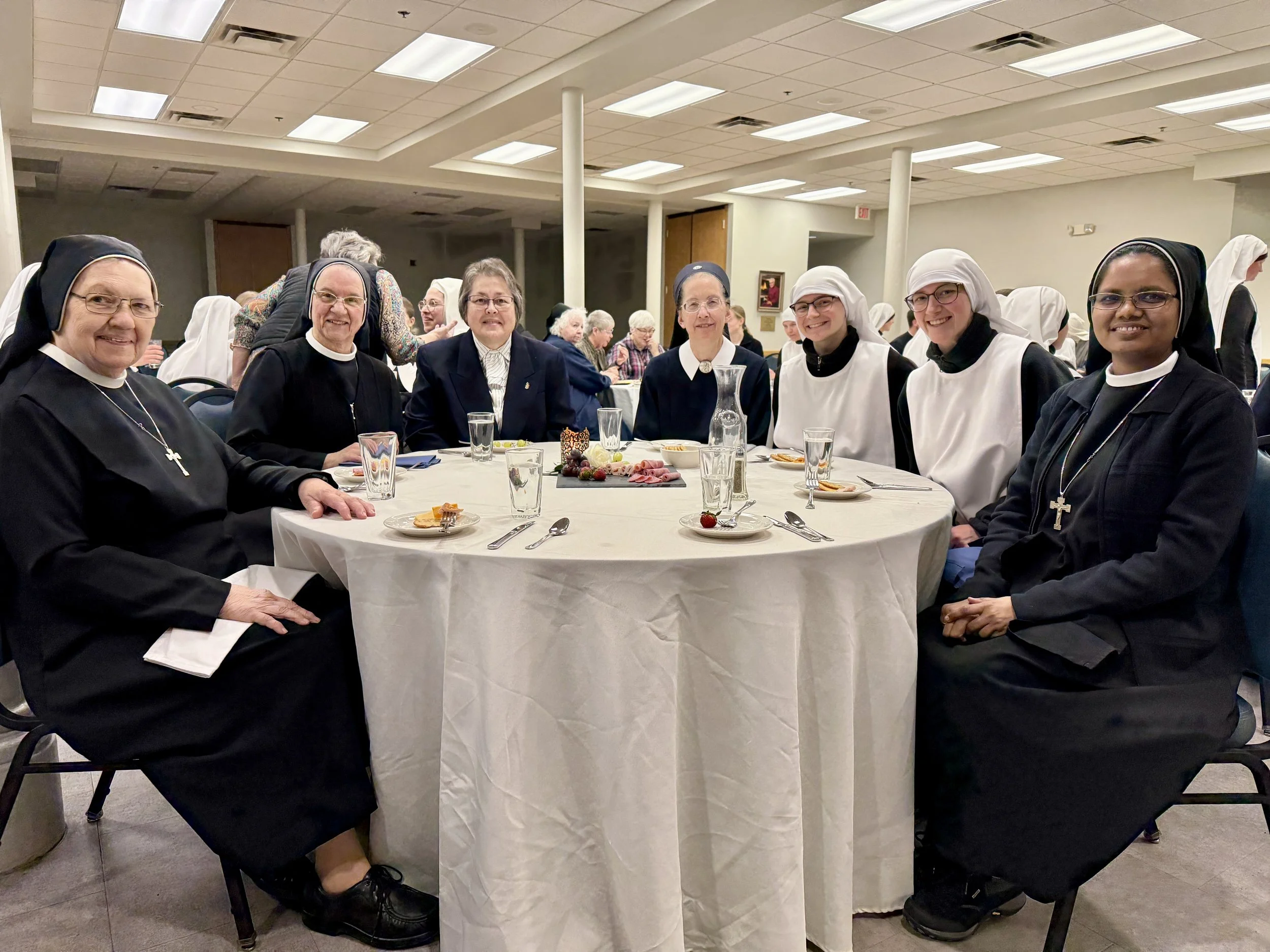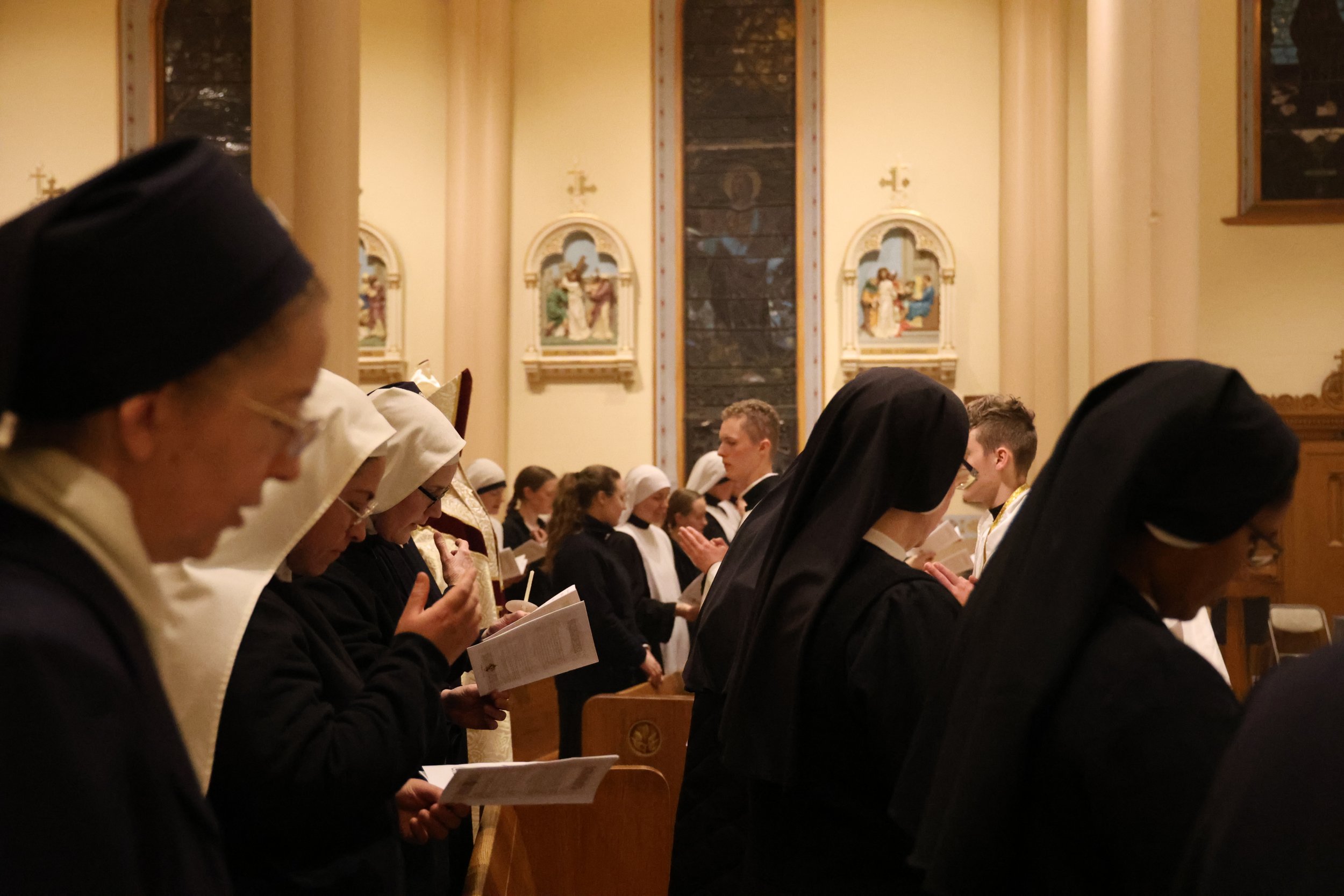A MESSAGE FROM BISHOP CHAD ZIELINSKI concerning the USCCB Special Pastoral Message expressing care and concern for immigrants in our nation. (Nov. 13, 2025)
Dear Brothers and Sisters in Christ,
November 13, 2025, we celebrate the Feast Day of St. Frances Xavier Cabrini. Mother Cabrini, an immigrant herself, lived an exemplary, virtuous life as a woman consecrated to Jesus Christ. She devoted her life to serving countless immigrants, as well as the poor, sick, and homeless in need. She was an exemplary model of living the Corporal Works of Mercy.
On November 12, at our annual Plenary Assembly in Baltimore, MD, the United States Conference of Catholic Bishops issued a Special Pastoral Message expressing deep care and concern for immigrants in our nation.
I think the message is clear and succinct, addressing the current pastoral concerns while being strongly grounded in Catholic social teaching. The letter makes it very clear that, as a nation, we have a right and a responsibility to secure our borders. Additionally, it makes clear that every person is imprinted with the sacred image of God, which demands that we respect the dignity and care of the human person.
I invite you to join me in prayer through the intercession of St. Frances Xavier Cabrini that we reach out to our brothers and sisters in Christ who are members of His Mystical Body.
THE FULL TEXT OF THE BISHOPS’ MESSAGE FOLLOWS:
BALTIMORE – As the United States Conference of Catholic Bishops (USCCB) gathered for its Fall Plenary Assembly in Baltimore, the bishops issued a Special Message addressing their concern for the evolving situation impacting immigrants in the United States. It marked the first time in 12 years that the USCCB invoked this particularly urgent form of speaking as a body of bishops. The last one issued in 2013 was in response to the federal government’s contraceptive mandate.
Under the regulations pertaining to statements and publications of the Conference, a “Special Message” may only be issued at plenary assemblies, and they are statements which the President of the Conference, the Administrative Committee, or the general membership considers to be appropriate in view of the circumstances at the time. To show the consensus of the body, a Special Message must receive two-thirds of the Conference members present and voting at the plenary in order to pass. In a vote of 216 votes in favor, 5 votes against, and 3 abstentions, the bishops overwhelmingly approved the Special Message, with sustained applause of the body following the vote.
FULL TEXT:
As pastors, we, the bishops of the United States, are bound to our people by ties of communion and compassion in Our Lord Jesus Christ. We are disturbed when we see among our people a climate of fear and anxiety around questions of profiling and immigration enforcement. We are saddened by the state of contemporary debate and the vilification of immigrants. We are concerned about the conditions in detention centers and the lack of access to pastoral care. We lament that some immigrants in the United States have arbitrarily lost their legal status. We are troubled by threats against the sanctity of houses of worship and the special nature of hospitals and schools. We are grieved when we meet parents who fear being detained when taking their children to school, and when we try to console family members who have already been separated from their loved ones.
Despite obstacles and prejudices, generations of immigrants have made enormous contributions to the well-being of our nation. We as Catholic bishops love our country and pray for its peace and prosperity. For this very reason, we feel compelled now in this environment to raise our voices in defense of God-given human dignity.
Catholic teaching exhorts nations to recognize the fundamental dignity of all persons, including immigrants. We bishops advocate for a meaningful reform of our nation’s immigration laws and procedures. Human dignity and national security are not in conflict. Both are possible if people of goodwill work together.
We recognize that nations have a responsibility to regulate their borders and establish a just and orderly immigration system for the sake of the common good. Without such processes, immigrants face the risk of trafficking and other forms of exploitation. Safe and legal pathways serve as an antidote to such risks.
The Church’s teaching rests on the foundational concern for the human person, as created in the image and likeness of God (Genesis 1:27). As pastors, we look to Sacred Scripture and the example of the Lord Himself, where we find the wisdom of God’s compassion. The priority of the Lord, as the Prophets remind us, is for those who are most vulnerable: the widow, the orphan, the poor, and the stranger (Zechariah 7:10). In the Lord Jesus, we see the One who became poor for our sake (2 Corinthians 8:9), we see the Good Samaritan who lifts us from the dust (Luke 10:30–37), and we see the One who is found in the least of these (Matthew 25). The Church’s concern for neighbor and our concern here for immigrants is a response to the Lord’s command to love as He has loved us (John 13:34).
To our immigrant brothers and sisters, we stand with you in your suffering, since when one member suffers, all suffer (cf. 1 Corinthians 12:26). You are not alone!
We note with gratitude that so many of our clergy, consecrated religious, and lay faithful already accompany and assist immigrants in meeting their basic human needs. We urge all people of goodwill to continue and expand such efforts.
We oppose the indiscriminate mass deportation of people. We pray for an end to dehumanizing rhetoric and violence, whether directed at immigrants or at law enforcement. We pray that the Lord may guide the leaders of our nation, and we are grateful for past and present opportunities to dialogue with public and elected officials. In this dialogue, we will continue to advocate for meaningful immigration reform.
As disciples of the Lord, we remain men and women of hope,
and hope does not disappoint! (cf. Romans 5:5)
May the mantle of Our Lady of Guadalupe enfold us all in her maternal and loving care and draw us ever closer to the heart of Christ.
__________________________________________________________________________
Obispos de EE. UU. emiten un «mensaje especial» sobre inmigración durante su asamblea plenaria en Baltimore
UN MESAJ DE LA EPISCOPUL CHAD ZIELINSKI privind Mesajul Pastoral Special al USCCB care exprimă grija și preocuparea pentru imigranții din națiunea noastră. (13 noiembrie 2025)
Dragi frați și surori în Hristos, Pe 13 noiembrie 2025, sărbătorim Ziua Sfântei Francisca Xavier Cabrini. Maica Cabrini, ea însăși imigrantă, a trăit o viață exemplară și virtuoasă ca femeie consacrată lui Isus Hristos. Și-a dedicat viața slujirii nenumăraților imigranți, precum și a celor săraci, bolnavi și fără adăpost aflați în nevoie. A fost un model exemplar de trăire a Lucrărilor Corporale ale Milostivirii. Pe 12 noiembrie, la Adunarea Plenară anuală din Baltimore, Maryland, Conferința Episcopilor Catolici a Statelor Unite a emis un Mesaj Pastoral Special, exprimând o profundă grijă și preocupare pentru imigranții din națiunea noastră. Cred că mesajul este clar și succint, abordând preocupările pastorale actuale, fiind în același timp puternic ancorat în doctrina socială catolică. Scrisoarea arată foarte clar că, ca națiune, avem dreptul și responsabilitatea de a ne securiza granițele. În plus, clarifică faptul că fiecare persoană este imprimată cu imaginea sacră a lui Dumnezeu, ceea ce ne cere să respectăm demnitatea și grija față de persoana umană. Vă invit să vă alăturați rugăciunii mele, prin mijlocirea Sfintei Francisca Xavier Cabrini, ca să ajungem la frații și surorile noastre în Hristos, care sunt membri ai Trupului Său Mistic.
Textul integral al mesajului episcopal urmează
BALTIMORE – Al reunirse la Conferencia de Obispos Católicos de los Estados Unidos (USCCB) durante su Asamblea Plenaria de Otoño en Baltimore, los obispos emitieron un mensaje especial en el que expresaron su preocupación por la situación cambiante que afecta a los inmigrantes en los Estados Unidos. Fue la primera vez en doce años que la USCCB recurrió a esta forma particularmente urgente de expresarse como cuerpo episcopal. La última vez que lo hizo fue en 2013, en respuesta al mandato federal sobre anticonceptivos.
De conformidad con las normas relativas a las declaraciones y publicaciones de la Conferencia, solo se pueden emitir «mensajes especiales» en las asambleas plenarias y se trata de declaraciones que el presidente de la Conferencia, el Comité Administrativo o el conjunto de los miembros considera apropiadas en vista de las circunstancias del momento. Para demostrar el consenso del organismo, un «mensaje especial» debe recibir dos tercios de los votos de los miembros de la Conferencia presentes y votantes en la sesión plenaria para ser aprobado. Con 216 votos a favor, 5 en contra y 3 abstenciones, los obispos aprobaron por abrumadora mayoría el mensaje especial, lo que fue seguido de un prolongado aplauso del organismo tras la votación.
El texto completo del mensaje especial de los obispos a continuación:
Como pastores, los obispos de los Estados Unidos, estamos unidos a nuestro pueblo en nuestro Señor Jesucristo, por lazos de comunión y compasión. Nos inquieta ver en nuestras comunidades un clima de temor y ansiedad ante las prácticas de perfilamiento y la aplicación de las leyes migratorias. Nos entristece profundamente el tono que ha adoptado el debate contemporáneo y la creciente denigración de los inmigrantes. Nos preocupan las condiciones en los centros de detención y la falta de acceso a una atención pastoral adecuada. Lamentamos que algunos inmigrantes que viven en los Estados Unidos han perdido su estatus migratorio de manera arbitraria. Nos preocupan las amenazas contra la santidad de los lugares de culto, y el carácter especial de los hospitales y las escuelas. Nos entristece profundamente cuando nos encontramos con padres que temen ser detenidos al llevar a sus hijos a la escuela o cuando intentamos consolar a familiares que ya han sido separados de sus seres queridos.
A pesar de los obstáculos y prejuicios, por generaciones, los inmigrantes han contribuido inmensamente al bienestar de nuestra nación. Como obispos católicos, profesamos nuestro amor por nuestro país y oramos por su paz y prosperidad. Por este preciso motivo nos sentimos obligados en este entorno a elevar nuestras voces en defensa de la dignidad humana otorgada por Dios.
La enseñanza católica exhorta a las naciones a reconocer la dignidad fundamental de todas las personas, incluidos los inmigrantes. Como obispos, abogamos por una reforma significativa de las leyes y los procedimientos migratorios de nuestra nación. La dignidad humana y la seguridad nacional no son valores en conflicto. Ambas pueden alcanzarse con buena voluntad y uniendo esfuerzos.
Reconocemos que las naciones tienen la responsabilidad de controlar sus fronteras y establecer un sistema de inmigración justo y ordenado por el bien común. Sin dichos procedimientos, los inmigrantes corren el riesgo de caer en la trata de personas y en otras formas de explotación. Las vías legales y seguras sirven como antídoto frente a esos riesgos.
La enseñanza de la Iglesia se basa en la preocupación fundamental por la persona humana, creada a imagen y semejanza de Dios. (Génesis 1:27). Como pastores, recurrimos a las Sagradas Escrituras y al ejemplo de Dios mismo, donde encontramos la sabiduría de la compasión de Dios. La prioridad del Señor, como nos recuerdan los profetas, es para los más vulnerables: las viudas, los huérfanos, los pobres y los migrantes (Zacarías 7:10). En el Señor Jesús, vemos a Aquel que se hizo pobre por nosotros (2 Corintios 8:9), vemos al buen samaritano que nos levanta del polvo (Lucas 10:30-37) y vemos a Aquel que se encuentra en los más pequeños (Mateo 25). La preocupación de la Iglesia por el prójimo y nuestra preocupación aquí por los inmigrantes son una respuesta al mandato del Señor de amar como Él nos ha amado (Juan 13:34).
A nuestros hermanos y hermanas inmigrantes, estamos con ustedes en su sufrimiento, pues si un miembro sufre, todos sufren (1 Corintios 12:26). ¡No están solos!
Observamos con gratitud que tantos de nuestros sacerdotes, religiosos consagrados, y fieles laicos ya están acompañando y asistiendo a inmigrantes en sus necesidades humanas básicas. Exhortamos a todas las personas de buena voluntad a continuar y ampliar esos esfuerzos.
Nos oponemos a las deportaciones masivas e indiscriminadas. Oramos por el fin de la retórica inhumana y de la violencia, ya sea dirigida contra inmigrantes o contra los organismos de seguridad. Oramos para que el Señor guíe a los líderes de nuestra nación y estamos agradecidos por las oportunidades pasadas y presentes de dialogar con funcionarios públicos y electos. En este diálogo, continuaremos abogando por una reforma migratoria significativa.
Como discípulos del Señor, seguimos siendo hombres y mujeres de esperanza, ¡y la esperanza no defrauda! (Romanos 5,5).
Que el manto de Nuestra Señora de Guadalupe nos envuelva a todos en su maternal y amoroso cuidado y nos acerque cada vez más al corazón de Cristo.

